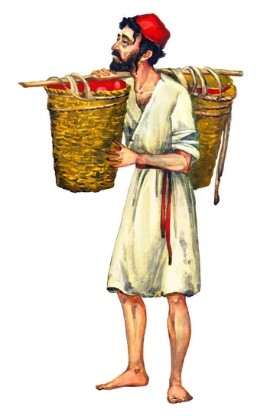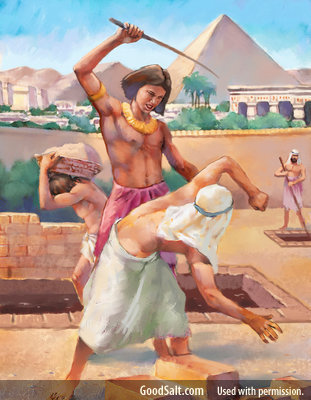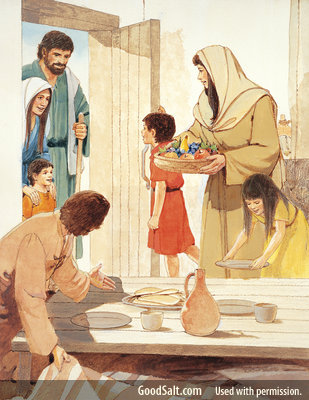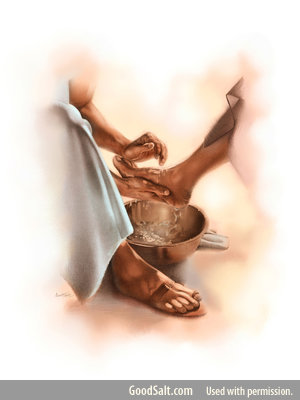(Leviticus 25:44–46) Does God Condone Slavery?
Posted May 01, 2025 by Kevin J. Mullins in Questions Concerning God's Character
“And as for your male and female slaves whom you may have—from the nations that are around you, from them you may buy male and female slaves. Moreover you may buy the children of the strangers who dwell among you, and their families who are with you, which they beget in your land; and they shall become your property. And you may take them as an inheritance for your children after you, to inherit them as a possession; they shall be your permanent slaves. But regarding your brethren, the children of Israel, you shall not rule over one another with rigor.” (Leviticus 25:44–46)
What does God mean when He says He is against the Israelites buying slaves from among their brethren but seems to condone the buying of slaves from the foreign nations? Furthermore, does the last sentence in verse 46 above suggest that the Israelites are allowed to treat the foreign slave with rigor, or as the Revised Standard Version says, “with harshness”?
What Does “slave” Mean in the Bible?



 First of all, we must be aware that when the Bible uses the word “slave” we should not immediately compare that to slavery as we know it today. The Hebrew word for a man slave is עֶבֶד (ʿeved), while the word for a female slave is אָמָה (ʾāmâ). The words indicate “someone bound to the service of another” and although in some cases it can mean harsh slavery, in most cases (and God’s ideal use of it) it is a voluntary act, in which someone who is buried in debt sells his/her labor to another in order to work off that debt.
First of all, we must be aware that when the Bible uses the word “slave” we should not immediately compare that to slavery as we know it today. The Hebrew word for a man slave is עֶבֶד (ʿeved), while the word for a female slave is אָמָה (ʾāmâ). The words indicate “someone bound to the service of another” and although in some cases it can mean harsh slavery, in most cases (and God’s ideal use of it) it is a voluntary act, in which someone who is buried in debt sells his/her labor to another in order to work off that debt.
“And if one of your brethren who dwells by you becomes poor, and sells himself to you, you shall not compel him to serve as a slave. As a hired servant and a sojourner he shall be with you, and shall serve you until the Year of Jubilee. And then he shall depart from you—he and his children with him—and shall return to his own family. He shall return to the possession of his fathers.” (Leviticus 25:39-41)
A poor Israelite could also sell himself as a debt-servant to a rich foreigner:
“Now if a sojourner or stranger close to you becomes rich, and one of your brethren who dwells by him becomes poor, and sells himself to the stranger or sojourner close to you, or to a member of the stranger’s family, after he is sold he may be redeemed again. One of his brothers may redeem him; or his uncle or his uncle’s son may redeem him; or anyone who is near of kin to him in his family may redeem him; or if he is able he may redeem himself.” (Leviticus 25:47-49)
As you can see, the poor Israelite is to be released from his/her servitude at the Year of the Jubilee and can also be redeemed back to his own family if he/she finds a way to pay off the debt sooner. However, this was not the case for the foreign debt-servant as can be seen above in Leviticus 25:44-46. The foreign debt-servant would become the Israelite’s permanent property who could be handed down to their children as an everlasting possession.
For those of us reading these things this may seem unfair, but we must realize what’s going on here. The Israelite was not allowed to simply seek out any foreigner they wanted to buy as a “slave.” God is unmistakably against anything resembling a slave trade as we know it.
“Whoever steals a man and sells him, and anyone found in possession of him, shall be put to death.” (Exodus 21:16)
Paul also condemns the practice of slave traders (men stealers/kidnappers) in 1 Timothy 1:10. Furthermore, any foreigner in Israel was to be treated with love and respect:
“And if a stranger dwells with you in your land, you shall not mistreat him. The stranger who dwells among you shall be to you as one born among you, and you shall love him as yourself; for you were strangers in the land of Egypt: I am the Lord your God.” (Leviticus 19:33, 34)
 Notice how God contrasts the treatment of foreigners by reminding the Israelites of the time they were foreigners in Egypt suffering harsh slavery. They were not to treat the foreigner as the Egyptians treated them. They were to be treated “as one born among you” or, in other words, like family. This clearly shows the two forms of “slavery” are completely different. In fact, unlike the Israelites who were denied “Sabbath rest” – שָׁבַת, shabath – (Exodus 5:4,5), God made it clear that all debt-servants dwelling with the Israelites (whether foreign or native) were to be given Sabbath rest, again reminding them of how they were treated in Egypt:
Notice how God contrasts the treatment of foreigners by reminding the Israelites of the time they were foreigners in Egypt suffering harsh slavery. They were not to treat the foreigner as the Egyptians treated them. They were to be treated “as one born among you” or, in other words, like family. This clearly shows the two forms of “slavery” are completely different. In fact, unlike the Israelites who were denied “Sabbath rest” – שָׁבַת, shabath – (Exodus 5:4,5), God made it clear that all debt-servants dwelling with the Israelites (whether foreign or native) were to be given Sabbath rest, again reminding them of how they were treated in Egypt:
“Observe the Sabbath day, to keep it holy, as the Lord your God commanded you. Six days you shall labor and do all your work, but the seventh day is the Sabbath of the Lord your God. In it you shall do no work: you, nor your son, nor your daughter, nor your male servant, nor your female servant, nor your ox, nor your donkey, nor any of your cattle, nor your stranger who is within your gates, that your male servant and your female servant may rest as well as you. And remember that you were a slave in the land of Egypt, and the Lord your God brought you out from there by a mighty hand and by an outstretched arm; therefore the Lord your God commanded you to keep the Sabbath day.” (Deuteronomy 5:12-15)
Remember, we are talking about debt-servants. In cases such as war, foreigners were left with nothing – oftentimes even losing their whole families. In an ideal situation, these foreigners would be taken in by the Israelites and treated as family. Sure, there were some Israelites who mistreated them, thus the laws on how to treat their debt-servants and the severe punishments for mistreatment.
God had chosen His people to be a light unto the Gentiles:
“For so hath the Lord commanded us, saying, I have set thee to be a light of the Gentiles, that thou shouldest be for salvation unto the ends of the earth.” (Acts 13:47)
 By giving them Sabbath rest, the Israelites were introducing the Gentiles to their Creator who loved them and made them in His image. Jesus said, “the Sabbath was made for man” (Mark 2:27). This includes all mankind, including the foreigners who desired to join themselves to the Lord and serve Him:
By giving them Sabbath rest, the Israelites were introducing the Gentiles to their Creator who loved them and made them in His image. Jesus said, “the Sabbath was made for man” (Mark 2:27). This includes all mankind, including the foreigners who desired to join themselves to the Lord and serve Him:
“Also the sons of the foreigner who join themselves to the Lord, to serve Him, And to love the name of the Lord, to be His servants— Everyone who keeps from defiling the Sabbath, and holds fast My covenant— Even them I will bring to My holy mountain, and make them joyful in My house of prayer. Their burnt offerings and their sacrifices will be accepted on My altar; for My house shall be called a house of prayer for all nations. The Lord God, who gathers the outcasts of Israel, says, ‘Yet I will gather to him others besides those who are gathered to him.’” (Isaiah 56:6-8)
Another point that shows the difference between the Israelites' form of “slavery” and the surrounding nations is the fact that Israelite slaves could break their service contracts simply by leaving:
“You shall not give back to his master the slave who has escaped from his master to you. He may dwell with you in your midst, in the place which he chooses within one of your gates, where it seems best to him; you shall not oppress him.” (Deuteronomy 23:15, 16)
Commenting on this, Doug Becker writes:
“Slavery in Israelite law was entered into voluntarily and could be ended voluntarily. This stands in stark contrast to other ancient Near Eastern law codes of the day, such as the Law of Hammurabi (ca. 1792–1750 BC), which gives a drastically different perspective on runaway slaves:
‘If a man should harbor a fugitive slave or slave woman of either the palace or of a commoner in his house and not bring him out at the herald’s public proclamation, that householder shall be killed.’
‘If a man seizes a fugitive slave or slave woman in the open country and leads him back to his owner, the slave owner shall give him 2 shekels of silver.’
‘If that slave should refuse to identify his owner, he shall lead him off to the palace, his circumstances shall be investigated, and they shall return him to his owner.’
‘If he should detain that slave in his own house and afterward the slave is discovered in his possession, that man shall be killed.’ (emergencenj.org. Does the Bible Condone Slavery?)
The Year of Jubilee
As mentioned earlier, the term of service that an Israelite could serve another ended at the Year of Jubilee. The Year of Jubilee came every seventh year. This means the maximum term would be six years.
“If you buy a Hebrew servant, he shall serve six years; and in the seventh he shall go out free and pay nothing.” (Exodus 21:2)
The book of Deuteronomy repeats this, but adds that the former master must provide the debt-servant with livestock and grain to help him/her get back on their feet as they set out on their own.
“If your brother, a Hebrew man, or a Hebrew woman, is sold to you and serves you six years, then in the seventh year you shall let him go free from you. And when you send him away free from you, you shall not let him go away empty-handed; you shall supply him liberally from your flock, from your threshing floor, and from your winepress. From what the Lord your God has blessed you with, you shall give to him.” (Deuteronomy 15:12-14)
Verses 16 and 17 reveal to us that life may be so good for the debt-servant that they may desire to stay with his/her master:
“And if it happens that he says to you, ‘I will not go away from you,’ because he loves you and your house, since he prospers with you, then you shall take an awl and thrust it through his ear to the door, and he shall be your servant forever. Also to your female servant you shall do likewise.” (Deuteronomy 15:16, 17)
The piercing of the ear was not meant as an exploitation (that the debt-servant was being held against their will) but was evidence that the debt-servant chose to remain with their master.
God even instructed that lenders could not refuse to lend to the poor if it was near the Year of Jubilee:
"Beware lest there be a wicked thought in your heart, saying, ‘The seventh year, the year of release, is at hand,’ and your eye be evil against your poor brother and you give him nothing, and he cry out to the Lord against you, and it become sin among you. You shall surely give to him, and your heart should not be grieved when you give to him, because for this thing the Lord your God will bless you in all your works and in all to which you put your hand. For the poor will never cease from the land; therefore I command you, saying, ‘You shall open your hand wide to your brother, to your poor and your needy, in your land.’" (Deuteronomy 15:9-11)
Later, in the book of Jeremiah, God rebukes His people for not adhering to this instruction (Jeremiah 34:8-17).
Going back to Exodus chapter 21 we read this apparently puzzling law concerning a female debt-servant and the Year of Jubilee:
“If he [the male debt-servant] comes in by himself, he shall go out by himself; if he comes in married, then his wife shall go out with him. If his master has given him a wife, and she has borne him sons or daughters, the wife and her children shall be her master’s, and he shall go out by himself.” (Exodus 21:3, 4)
Is this blatant mistreatment of women? Doug Becker writes:
“At first blush, this seems misogynistic, denying the woman of the same rights given to the man in the previous verse. A man can be released after six years, but not a woman? This is emphatically not what is going on here. Notice that the woman in question was given to the male slave as a wife during his time as a slave. This woman would have been a female slave. What this passage is teaching is that her term of service is not to be cut short simply because her husband’s ended before hers. In such a case, his options would have been either to wait for her to be freed or to ransom her, perhaps with some of the provisions that he received at the time of his release. As for the children, these would all be young, a maximum of five years old (assuming the woman entered service a year after the man and was married to him immediately), an age at which they need their mother, not their father. This law probably would have influenced how often marriage between slaves would have taken place and would have prevented women from foolishly entering into a marriage only to gain an early manumission.” (emergencenj.org. Does the Bible Condone Slavery?)
Continuing in Exodus 21 we read:
“And if a man sells his daughter to be a female slave, she shall not go out [at the end of six years] as the male slaves do. If she does not please her master, who has betrothed her to himself, then he shall let her be redeemed. He shall have no right to sell her to a foreign people, since he has dealt deceitfully with her.” (Exodus 21: 7, 8)
The reason why the female debt-servant was not to leave after the six years is because she was involved in an arranged marriage to her master. If the master divorces her (“if she does not please her master”) he cannot simply sell her to a foreigner for profit, but must allow her to be redeemed by her family.
“And if he has betrothed her to his son, he shall deal with her according to the custom of daughters.” (Exodus 21:9)
Here we see that if the female debt-servant is married to the master’s son then she must be treated as his biological daughter and her children would benefit with full inheritance rights.
“If he takes another wife, he shall not diminish her food, her clothing, and her marriage rights. And if he does not do these three for her, then she shall go out free, without paying money.” (Exodus 21:10, 11)
If the master or his son is a polygamist, the female debt-servant must still be treated with love and respect. If she is found to be mistreated, then her debt would be completely forgiven and “she shall go out free, without paying money.” Clearly these set of laws were put in place to protect the female debt-servant, not to exploit her.
The Mistreatment of Debt-Servants
“And if a man beats his male or female servant with a rod, so that he dies under his hand, he shall surely be punished. Notwithstanding, if he remains alive a day or two, he shall not be punished; for he is his property.” (Exodus 21:20, 21)
Many are confused as to how this reads in the English. It is taught (especially by Atheists) that God is here condoning the abuse of a servant by his owner as long as the servant does not die. The confusion is based upon the phrase‚ “he shall not be punished” as long as the servant is okay after a couple days. What is being said is that the owner is not punished with death by the court as he would be if he were to murder his servant. It’s not that he isn’t punished at all for brutally beating his servant. His punishment is that his servant will be out of work and the owner will lose money because of work lost. The phrase, “for he is his property” means, “for he is his money” (see King James Version). The Contemporary English Version translates it this way:
“Death is the punishment for beating to death any of your slaves. However, if the slave lives a few days after the beating, you are not to be punished. After all, you have already lost the services of that slave who was your property.” (Exodus 21:20, 21)
God is not condoning abuse but gave this Command to deter any type of abuse. It goes along with the sentence of an “eye for eye, tooth for tooth” which is found in the same context a few verses down (Exodus 21:23-27). Verses 26 and 27 say the debt-servant is to go free thus the master will lose out on his services:
 “If a man strikes the eye of his male or female servant, and destroys it, he shall let him go free for the sake of his eye. And if he knocks out the tooth of his male or female servant, he shall let him go free for the sake of his tooth.”
“If a man strikes the eye of his male or female servant, and destroys it, he shall let him go free for the sake of his eye. And if he knocks out the tooth of his male or female servant, he shall let him go free for the sake of his tooth.”
Paul says: “whatever a man may sow, that he also will reap” (Galatians 6:7-10). If a person sows brutality, they will reap its consequences. (For more details concerning the statute of “Eye for eye, tooth for tooth” see the articled entitled: What About the Retributive Justice of “An Eye For An Eye”?)
As you can see, these so-called “slavery laws” were put in place by God as accommodations IF a master mistreated them. The word “if” implies the master has gone beyond the boundaries God has set in place. Just as in the case above concerning the master involved in polygamy, the laws do not sanction the practice, but give accommodations to people living in a certain culture.
“If the idea of debt servitude strikes us a primitive, we need to remember that many of the options that are available to us today were not available in the ancient world, for better or for worse. And how preferable is the modern situation, where the poor grow ever poorer as debt grows and grows, until the only option for the poor becomes bankruptcy, which not only destroys the debtor’s access to credit, but also amounts to breaking one’s oath at best, and thievery at worst? This system in ancient Israel was intended to maintain incentives to lend to the poor, where interest is not an option and when the risk of default was often quite high. These are the kinds of situations addressed by Old Testament law in a society that differed greatly from our own. It isn’t a matter of whether these options would be good for us, [living in the twenty-first century], but whether or not these were good for the ancient Israelites, living from 1200 to 586 BC.” (emergencenj.org. Does the Bible Condone Slavery?)
God was simply meeting them where they were. Without these laws, foreign “slaves” would remain mistreated among the nations and so God provided a way to bring them into a covenant relationship with Him and His people.
“But Jesus called them to Himself and said, ‘You know that the rulers of the Gentiles lord it over them, and those who are great exercise authority over them. Yet it shall not be so among you; but whoever desires to become great among you, let him be your servant. And whoever desires to be first among you, let him be your slave— just as the Son of Man [The Messiah/Jesus] did not come to be served, but to serve, and to give His life a ransom for many.” (Matthew 20:25-28)
To the Christians in Ephesus Paul instructs, not only the debt-servants to be obedient to their masters as they are to Christ, but that the masters treat them with love and respect as Christ (our Master) treats us:
“Bondservants, be obedient to those who are your masters according to the flesh, with fear and trembling, in sincerity of heart, as to Christ; not with eyeservice, as men-pleasers, but as bondservants of Christ, doing the will of God from the heart, with goodwill doing service, as to the Lord, and not to men, knowing that whatever good anyone does, he will receive the same from the Lord, whether he is a slave or free. And you, masters, do the same things to them, giving up threatening, knowing that your own Master also is in heaven, and there is no partiality with Him.” (Ephesians 6:5-9)
Paul gives the same instructions to the Christian masters in Colossae:
“Masters, give your bondservants what is just and fair, knowing that you also have a Master in heaven.” (Colossians 4:1)
Peter, speaking to servants with non-Christian masters who treat them harshly, instructs them to be patient and submissive and endure the grief as Christ endured and bore our sin (our natural hostility) against Him (Romans 8:7) without lashing back with threats or violence:
 “Servants, be submissive to your masters with all fear, not only to the good and gentle, but also to the harsh. For this is commendable, if because of conscience toward God one endures grief, suffering wrongfully. For what credit is it if, when you are beaten for your faults, you take it patiently? But when you do good and suffer, if you take it patiently, this is commendable before God. For to this you were called, because Christ also suffered for us, leaving us an example, that you should follow His steps: ‘Who committed no sin, nor was deceit found in His mouth’; who, when He was reviled, did not revile in return; when He suffered, He did not threaten, but committed Himself to Him who judges righteously; who Himself bore our sins in His own body on the tree, that we, having died to sins, might live for righteousness—by whose stripes you were healed. For you were like sheep going astray, but have now returned to the Shepherd and Overseer of your souls.” (1 Peter 2:18-25)
“Servants, be submissive to your masters with all fear, not only to the good and gentle, but also to the harsh. For this is commendable, if because of conscience toward God one endures grief, suffering wrongfully. For what credit is it if, when you are beaten for your faults, you take it patiently? But when you do good and suffer, if you take it patiently, this is commendable before God. For to this you were called, because Christ also suffered for us, leaving us an example, that you should follow His steps: ‘Who committed no sin, nor was deceit found in His mouth’; who, when He was reviled, did not revile in return; when He suffered, He did not threaten, but committed Himself to Him who judges righteously; who Himself bore our sins in His own body on the tree, that we, having died to sins, might live for righteousness—by whose stripes you were healed. For you were like sheep going astray, but have now returned to the Shepherd and Overseer of your souls.” (1 Peter 2:18-25)
Keep in mind, Peter is writing to believers in the first century AD who are under Roman law, therefore the consequences of injuring a “slave” (that they will be released from service) does not apply here. Roman slavery was mostly brutal and did not consent to God’s Law. There were of course some Roman masters who treated their slaves kindly as did the Roman centurion who sought Jesus to heal his servant (Luke 7:1-11).
Peter’s instruction not only saves the slave from further injury, but maybe, just maybe, will lead a Roman soldier to see the character of God in the slave; for it is the goodness of God that leads one to repentance (Romans 2:4).
“For you are all sons of God through faith in Christ Jesus. For as many of you as were baptized into Christ have put on Christ. There is neither Jew nor Greek, there is neither slave nor free, there is neither male nor female; for you are all one in Christ Jesus. And if you are Christ’s, then you are Abraham’s seed, and heirs according to the promise.” (Galatians 3:26-29)
*****
Nepali Translation of this article: (लेवी २५:४४-४६) के परमेश्वरले दासत्वलाई स्विकृति दिनुहुन्छ?
